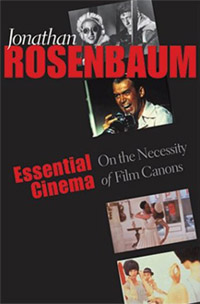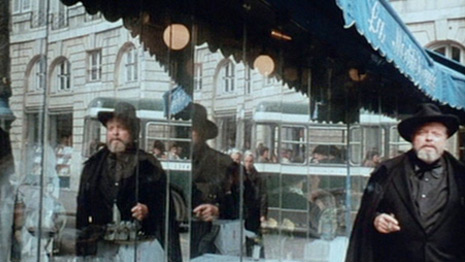Published with the screenplay by Santa Teresa Press in the fall of 1987, and reprinted in my 2007 collection Discovering Orson Welles (along with the introductory paragraphs that follow, tweaked and abridged somewhat). The photograph of Welles’s typewriter reproduced below was taken by Kodar’s nephew, Aleksander (“Sasha”), and Oja herself can be seen lurking indistinctly in a corner. (What I presume is one of her sculptures, on the desk, is more visible.)
When I presented [a] Welles tribute at the Santa Barbara film festival in 1986,
one person in the audience who introduced himself to me afterwards was James
Pepper, a local rare book dealer who, in response to my assertion that the Welles screenplay for The Big Brass Ring should be published, expressed some interest in bringing out a limited edition of 1,000 copies. Having already brought out a handsome volume devoted to Robert Towne’s original screenplay for Chinatown in a similar way, he seemed to know what he was talking about, and I conveyed his proposal to Oja Kodar [whom I had recently met at the Rotterdam Film Festival].
The following year, around the time I was preparing to make a permanent move to Chicago to write for the Chicago Reader, the book appeared. Read more
From Kevin Lee’s web site, posted circa 2004. — J.R.
The following questions for Jonathan Rosenbaum were compiled by myself and esteemed colleagues at the IMDb Classic Film Board. They were e-mailed to Rosenbaum on the occasion of the release of his book ESSENTIAL CINEMA. His responses appear after each question.

Q- I was actually quite surprised when I saw that your book argued for the necessity of canons, given your previous criticism of the AFI’s top 100 lists and how it institutionalizes popular taste in much the same way as any canon does. Also, you testify to the profound affect that the Sight and Sound top 10 list had on you during your college years (as was the case for me) — but couldn’t one say that this, or any list, may be as limiting in its own way (in the perspective it espouses) as the AFI list? If the goal is to encourage people to see as many things as possible, I wonder if any canon or list alone is up to that task. Would you agree to that the problem is not in these canons or lists but in our attitudes towards them (for example, I don’t think it was the virtue of the Sight and Sound list in itself, but your attitude towards it, that made it worthwhile)? Read more
Written for Criterion’s DVD release of F for Fake in 2005. — J.R.

There were plenty of advantages to living in Paris in the early 1970s, especially if one was a movie buff with time on one’s hands. The Parisian film world is relatively small, and simply being on the fringes of it afforded some exciting opportunities, even for a writer like myself who’d barely published. Leaving the Cinémathèque at the Palais de Chaillot one night, I was invited to be an extra in a Robert Bresson film that was being shot a few blocks away. And in early July 1972, while writing for Film Comment about Orson Welles’s first Hollywood project, Heart of Darkness, I learned Welles was in town and sent a letter to him at Antégor, the editing studio where he was working, asking a few simple questions—only to find myself getting a call from one of his assistants two days later: “Mr. Welles was wondering if you could have lunch with him today.”

I met him at La Méditerranée — the same seafood restaurant that would figure prominently in the film he was editing — and when I began by expressing my amazement that he’d invited me, he cordially explained that this was because he didn’t have time to answer my letter. Read more



